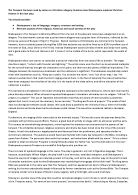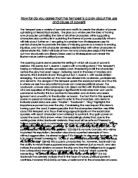But some events in the play clearly belong to comedy. The sub-plot concerning Stephano, Trinculo and Caliban from Act II onwards is grotesque. The three servants of little moral and dignity meet and conspire to take over the island by murdering Prospero. Their ridiculous behaviour calls for laughs. Indeed, when they come together in Act II, Scene 2, the episode of the « monster » is purely designed by Shakespeare to amuse. And afterwards they drink, tell stories, laugh, sing... In Act II, Shakespeare uses a classic device of Commedia dell’arte : misunderstanding followed by beatings. Ariel, Prospero’s faithful spirit, plays more tricks on them as leading them through a thorns and brambles and then into a swamp. The end is one of a comedy :a happy one. Indeed, nobody dies, order is restored when Prospero has his dukedom returned, enemies are forgiven and Ferdinand and Miranda will get married.
Shakespeare in The Tempest has created many diverse characters. Some lower class characters like Trinculo and Stephano, the boatswain obviously are comic. Ferdinand and Miranda are the young noble lovers, the base of many shakespearian comedies. The give a light, refreshing tone to the play by their innocence and kindness. Gonzalo, Alonso’s old councillor is a very positive figure, noble, honest, optimistic but he is too simple to be be tragic.
Antonio and Sebastian by their desire for power and lack of moral values could be considered as a distant image of Macbeth. Both intelligent, courageous, they encourage one another to betray and murder. Alonso, King of Naples during the play is exposed to considerable torment. He is not clearly defined because he is in an unusual state of mind : he suffers severly from the lose of his son Ferdinand.
Prospero and Caliban are extremely complex characters which makes them more difficult to classify. Prospero has a tragic background : the spectator hears about his career and his downfall and witnesses to his return to power. Although he can be selfish and harsh with his servants, he is compassionate, forgiving, moderate and he doesn’t die at the end which excludes him from the category of the tragic heros. But he is too noble to be anything like to comic. Caliban is very difficult to understand. Half animal, half human, he sems to obey his wildest instincts whilst having the conscience of a human being.
The main theme of the play, the possession and the use of power could have been that of a tragedy.There are many king/subject relationships and most of them go wrong. Prospero loses his dukedom because of his selfish desire to study arts. Sebastian and Antonio seek to murder Alonso and Gonzalo. Both Ariel and Caliban want to break free of Prospero’s authority. Treachery and usurpation are present all through the play. Madness, a frequent device in tragedies appears in The Tempest. But another important theme is forgiveness and this is typical of an end of a comedy as is the wedding of two young people.
It is clear that The Tempest is the perfect example of a tragi-comedy. In the action, the characters and the themes, the spectator is presented with elements of tragedy and comedy intertwined in a very subtle way by Shakespeare in order to entertain and to present a vivid picture of the troubles of a leader faced with his responsabilities.







